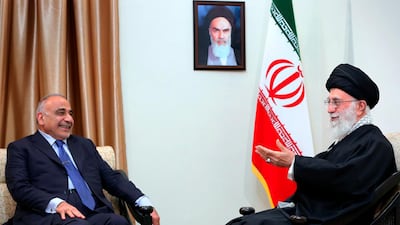Iraq’s new government is seeking to re-enter regional diplomacy as the Middle East’s neutral player, experts say, following a series of high-level international visits to Baghdad.
Adel Abdul Mahdi became the second prime minister in post-Saddam Iraq not to hail from the Shiite Dawa party last October, and has faced the unenviable task of rebuilding the country after a brutal battle with ISIS.
He is also working on healing Iraq’s ethnic and sectarian tensions and balancing foreign relations with the country’s two major allies, Iran and the US.
With a new administration in Baghdad, international actors are vying for Iraq's influence, while politicians in Baghdad aim for neutrality.
"There is a genuine niche for Iraq, if they wish to fill it," Michael Knights, a senior fellow at the Washington Institute for Near East Policy, told The National.
According to Mr Knights, Iraq has a window of opportunity to pursue neutrality for the sake of rebuilding the country and restoring its economy.
In the past four months, the country has welcomed high-level officials such as Iranian President Hassan Rouhani, US Secretary of State Mike Pompeo and Saudi Arabia’s Minister of Trade Majid Al Kassabi.
Iraq is seeking economic benefits from the international community as it emerges from a disastrous conflict with ISIS, who seized almost a third of the country before being forced to retreat in 2017.
Officials in Baghdad said last year they need at least $88 billion to recover from three years of war, to rebuild homes, hospitals, schools, roads, businesses and telecommunications that are vital to providing jobs for the young, reversing displacement, and putting an end to decades of political and sectarian violence.
“Baghdad knows that the Iranian and non-Iranian blocs – plus Turkey, Russia and Asian countries – are open to closer relations,” Mr Knights said.
Just like in Syria, the Gulf Arab states have accepted that they can't eject Iran, so they can have some role, or no role at all, Kirk Sowell, an Iraq expert with Utica Risk Services company, told The National.
Riyadh has been courting Baghdad in efforts to boost economic, trade and tourism ties, and fend off Tehran’s increasing influence in the region.
A high-profile Saudi delegation led by Mr Kassabi announced last week that the Kingdom will fund the construction of a $1 billion sports city in Baghdad as well as open four consulates across the country.
The two states are expecting to re-open the Arar border crossing by October.
In October 2017, two months before Iraq declared victory over ISIS, the two nations decided to establish the council to help rebuild devastated areas retaken from the militants in Iraq.
The Iraqi premier announced last week that he will visit Saudi Arabia but did not specify a date.
The UAE announced in 2018 that it would finance a $50.4 million project to rebuild the Grand Al Nuri Mosque in Mosul, famous for its 12th-century leaning minaret, destroyed by the insurgents.
Washington has praised the initiatives taken by Abu Dhabi and Riyadh.
US Secretary of State Mr Pompeo visited Iraq in January in an unannounced stop during his regional tour to promote the White House's hard-line position on Iran.
It was the third high-profile visit by an American official to Iraq in nearly a month.
Iraqi politicians showed frustration with Washington after US President Donald Trump made an unscheduled visit to a US military base in western Iraq without meeting Mr Abdul Mahdi.
Mr Trump later announced that he will keep the US military in Iraq, in order to “keep a close eye on Iran”.
“All of these actors are competing with Tehran,” Mr Knights said.
The hostility between Iran and the US increased after Mr Trump's decision last year to pull out of an international accord curbing Tehran's nuclear programme and to reimpose economic sanctions on Tehran.
But Baghdad relies heavily on Iranian gas to feed it power stations across the country, importing approximately 1.5 billion cubic feet per day via pipelines in the south and east.
In March, the US granted Iraq a 90-day waiver exempting it from sanctions to buy energy from Iran.
"While this waiver is intended to help Iraq mitigate energy shortages, we continue to discuss our Iran-related sanctions with our partners in Iraq," a US state department official told The National.
The US is determined to work with Iraq to end its “dependence on Iranian natural gas and electricity and increase its energy independence,” the official said.
Aiming to keep a neutral stance while facing pressures from Washington, Mr Abdul Mahdi arrived in Tehran on Saturday and met with Iran’s top leader Ayatollah Ali Khamenei and Mr Rouhani.
Ayatollah Khamenei urged Iraq to demand US troops leave “as soon as possible”, while announcing deeper economic ties between the two states.
In response the Iraqi premier reaffirmed his country's sovereignty said that Iraq is in a position of "being open" towards all its neighbouring countries.
The two states announced on Sunday an agreement to develop two oilfields on their border and merge their air defence systems, despite warnings from Washington.
Many Iraqi politicians have close ties with Iran, making it difficult to halt Iranian pressure in Iraq's internal politics.


